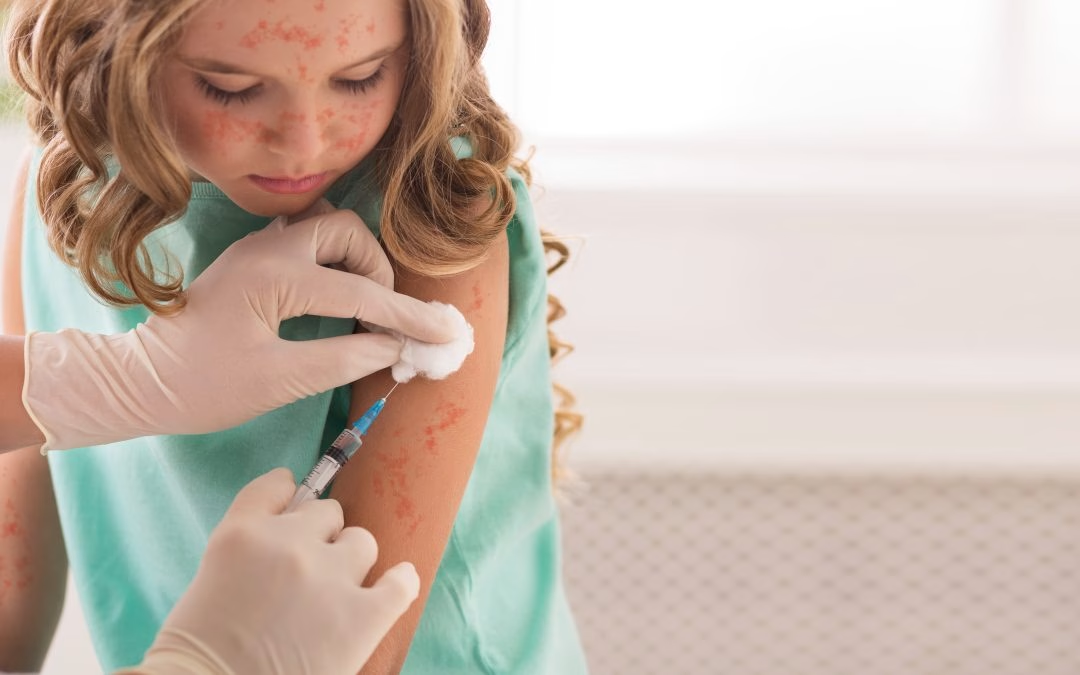
Imagine spending your weekend enjoying family outings at parks, a museum, and Breakout Games, only to later hear that measles is spreading in your area. With COVID still fresh in our minds, such news can quickly become a source of concern. AFC Ooltewah is ready to break down the facts for you. Measles, a highly contagious virus, has seen a recent uptick in cases across the U.S., making a comeback as vaccination numbers decline. Here’s what you need to know to stay informed and safe.
What is Measles?
Measles, often called rubeola, is a viral infection that quickly spreads through coughs, sneezes, or close contact with an infected person. It mainly affects children, with the youngest being at the highest risk. Thanks to widespread vaccination, measles used to be common but is now largely preventable, though it still can cause serious health problems.
Key Symptoms of Measles
Symptoms typically appear 7-14 days after exposure and may include:
- Fever: Often high, exceeding 101°F
- Cough, Runny Nose, and Red Eyes: Known as the “3 C’s”
- Rash: Appears 3-5 days after the fever begins and typically starts on the face before spreading downward
- Koplik Spots: Tiny white spots on the inside of the mouth, appearing before the rash
Contact AFC Ooltewah today if you suspect that you might have measles.
How Does Measles Spread?
- Airborne Transmission: Measles can linger in the air for up to two hours after an infected person leaves the area
- Contact with Infected Surfaces: The virus can live on contaminated surfaces for hours
- Unvaccinated Individuals: Those without proper immunization are at higher risk
Prevention: How to Protect Yourself
- Vaccination: The MMR (Measles, Mumps, Rubella) vaccine is highly effective at preventing measles. It is typically given in two doses, one at 12-15 months and another between 4-6 years.
- Isolation Measures: If you suspect someone has measles, isolate them immediately to reduce exposure to others.
- Masking & Hygiene: Wearing a mask and cleaning contaminated areas can prevent the spread.
What to Do If You Suspect Measles
If you or someone you know may have measles, follow these steps:
- Contact Your Healthcare Provider: Alert your health provider or local health department immediately.
- Isolate the Patient: To prevent the spread, keep the individual in a separate room away from others.
- Follow Medical Advice: The patient may be advised to stay home for at least 10 days or until cleared by public health authorities.
- Clean & Disinfect: Areas where the infected person has been, should be cleaned thoroughly with disinfectant wipes to eliminate lingering virus particles.
Common Conditions That Resemble Measles
Several illnesses can present symptoms similar to measles, including:
- Rubella: Features a faster-spreading rash and swollen lymph nodes
- Roseola: Rash appears after a high fever breaks, common in young children
- Scarlet Fever: Known for a rough, sandpaper-like rash and “strawberry tongue”
- Fifth Disease (Parvovirus B19): Causes a distinctive “slapped cheek” rash
Contact AFC Ooltewah today if you are experiencing any of these symptoms.
Why Early Recognition Matters
Early detection of measles is key to reducing outbreaks and protecting those at risk. Healthcare providers are essential in recognizing the signs and quickly taking steps to limit exposure.
The best way to guard against measles is to get vaccinated, which not only protects you but also your community. If you believe you’ve been exposed or notice symptoms, act without delay by contacting your healthcare provider and adhering to safety guidelines. For more information on services, contact AFC Urgent Care Ooltewah.
Remaining informed and vigilant helps us all prevent the spread of this illness.

